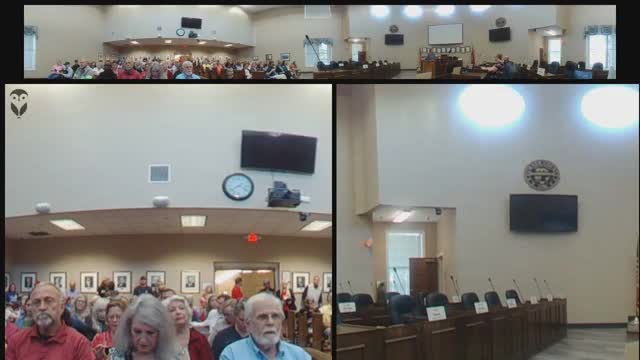Sumner County library work study draws large public turnout over proposed collection policy on transgender materials
Get AI-powered insights, summaries, and transcripts
Subscribe
Summary
At a Oct. 8 work study, the Sumner County Library Board heard about 23 public commenters on a proposed collection development policy that opponents say would remove books addressing transgender issues; no formal vote was taken and a full vote is scheduled for Oct. 14.
HENDERSONVILLE, Tenn. — The Sumner County Library Board held a work study meeting Oct. 8 to hear public comment on a proposed revision to the system’s collection development policy that critics say would remove books addressing transgender issues. The session, converted to a work study because of a lack of quorum, allowed roughly 23 people three minutes each to speak; board members made no formal policy decision at the meeting.
The proposed policy and the public turnout drew sharp disagreement. “Ms. Daniels is no longer a resident of Sumner County,” said Anne Marlin, identifying herself as a resident, arguing that the board chair should not be allowed to bring the policy forward. Several speakers warned of potential legal challenges if the policy were adopted, while others said the proposed changes were needed to protect children.
The public comment period stretched about an hour and included a mix of parents, clergy, educators and other residents. Taylor Johnson, who identified herself as a school librarian in the county, urged the board to consider how few library records in the county catalog include the word “transgender,” saying, “At Hendersonville, there were a total of 2,822 resources … only 100 sources came up with a specific word, transgender.” Multiple speakers said the policy as drafted would affect materials for adults and children alike; others urged age-based restrictions instead.
Board members and the chair emphasized that the work study was for discussion only and that no official vote would be taken. The board chair (name not provided in the transcript) told the room the board’s authority flows from the state: “There’s 2 different types of library boards. There’s advisory and there’s policy making. In Sumner County, we make the policies… Our power comes from the state.” The chair also said a formal meeting with a vote is scheduled for Oct. 14 at the Hendersonville Library at 3:30 p.m.
Several commenters raised procedural concerns. Anne Marlin and others said the board’s bylaws require members to be Sumner County residents (citing “Article 3” of the bylaws as described in public comment), and questioned whether a board member who does not meet that residency requirement should be bringing policy changes forward. The chair acknowledged those objections and described the process the board follows for reviewing challenged materials, saying library directors are expected to report their decisions to the board for review.
Speakers on both sides framed their arguments mainly as matters of child welfare, community standards and constitutional or religious principles. Some callers, including clergy, framed the dispute in religious terms; other speakers, including librarians and educators, urged the board to preserve access and to use established collection-review practices instead of broad removals. One resident quoted a memo sent to library officials by Secretary of State Trey Hockett reminding boards of an executive order concerning the use of federal funds.
No motions to adopt or reject the collection policy were taken during the session. The only formal action during the recorded portion was a motion to amend the agenda so the meeting could proceed as a work study focusing on public comment and “discussion of the collection development policy only,” a motion moved by Mike and seconded by Pam; the chair called the voice vote in favor. The board said it will reconvene on Oct. 14 for a meeting at which a formal vote can occur.
For now the matter remains under discussion. Commenters asked the board to consider age restrictions, cataloging practices, the authority of library directors to pull materials for board review, and the legal consequences of a board-level ban. The board signaled it will review material reports from library directors, consider public feedback and return to the policy for a formal decision at the scheduled meeting next week.
Community members who want to submit titles for review were told to notify the library director and the board so the items can be logged and considered under the collection review process.
